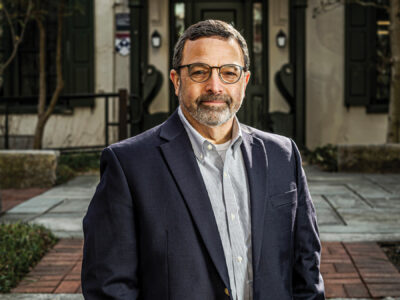
Yael Lehmann SW’06 still has a vivid memory of the diabetic woman with the amputated leg who had no place to buy fresh food in her section of Chester, Pennsylvania.
“Before the market came, she wasn’t able to buy fresh food for her diet, and it was so crucial,” says Lehmann. “She was talking to me about her health problems and how the market meant so much to her personally.”
Lehmann is executive director of the Food Trust, a nonprofit organization that works to improve access to affordable and nutritious food and promote better health in the Philadelphia area. The market in question—run by an Amish farmer in a parking lot near a health clinic—is just one of 20 area farmers markets supported by the organization.
In addition to providing financial and logistical support for vegetable and produce stands, the Food Trust helps to bring more grocery stores to the region and encourages healthful-eating choices among schoolchildren.
The Food Trust has been around since 1992, and Lehmann became deputy director five years ago while still a graduate student in the School of Social Policy and Practice. Last February she took the helm.
“I think I fell into it to a certain extent,” she says. “I’ve always had a passion for food.”
Lehmann is not the only Penn alum at the Food Trust. John Weidman G’97 is the organization’s deputy director, and Dr. Allison Karpyn Gr’03 is director of research and evaluation.
“I really liked the spirit and mission of the agency,” says Karpyn, “and thought it was exciting they had made the decision to have a position like mine at a time when they were an agency of only 12 people.”
In the coming year Karpyn will be busy with a study comparing health outcomes in the Progress Plaza neighborhood of North Philadelphia, where a new supermarket is being built, to the outcomes in a Southwest Philadelphia neighborhood that has no supermarket. In a sense, she says, it comes “full circle” back to a 2001 study that mapped low-income neighborhoods with a prevalence of diet-related deaths and no local supermarkets.
That study found that Philadelphia had the second-lowest number of supermarkets per capita among major cities in the United States.
“There was a feeling that a lot of the markets were almost redlining these poor neighborhoods because the money’s not there,” Lehmann says. “There was a perception that the city wasn’t safe and they would have to invest a lot of money up front trying to protect their stores.” The Food Trust brought the grocers to the table to begin addressing their concerns.
Two years ago it formed the Fresh Food Financing Initiative (FFFI) with the Greater Philadelphia Urban Affairs Coalition and the Reinvestment Fund, working with the Commonwealth of Pennsylvania to arrange public-private financing to bring more grocery stores to underserved communities. FFFI was named one of the top 50 public programs in the country this year by Harvard’s Kennedy School of Government, and the Food Trust has received a grant from the Robert Wood Johnson Foundation to replicate it across the nation.
Lehmann’s organization has also aimed its efforts at Philadelphia schools. It worked with Dr. Gary Foster GEd’90, formerly the clinical director of Penn Medicine’s Weight and Eating Disorders Program, on a three-part study of healthful-eating interventions for elementary-school children.
Junk foods were removed and teachers were given training and required to integrate nutrition into their curricula for at least 50 hours a year. The study, which hasn’t been released yet, found a 33 percent reduction in the number of new cases of obesity and a 35 percent reduction in the total number of obesity cases in schools with the program, as compared to the control schools.
Thanks to the Food Trust, sodas have now been ousted from drink machines across the school district and replaced by water, orange juice, and milk. The group is still working with the schools to revamp the vending-machine selections.
But it’s not just in-school noshing that concerns the Food Trust, which has tried to promote more healthful selections in Philadelphia’s corner stores, where students spend an estimated $16.8 million a year on snacks. With the help of Penn’s Cartographic Modeling Laboratory, the Food Trust created maps showing the businesses that middle-school students passed on their way home from school. It then hired a communications firm to imitate the splashy store signs and shelf stickers used by chips and soda companies in a campaign to encourage better snack choices—and offered $300 incentives for the stores to post their healthful-eating marketing messages.
Two other Food Trust staffers attended a banquet held by the Korean Grocers Association of Greater Philadelphia; there they met a Korean doctor who was respected in his tight-knit community and smoothed the way with additional store-owners.
“When it came down to it, [the grocers] participated because they actually care about the kids,” Lehmann says. “They didn’t want to see their profits go down, but they were willing to take a leap of faith and see how it goes.”
—Susan Frith




